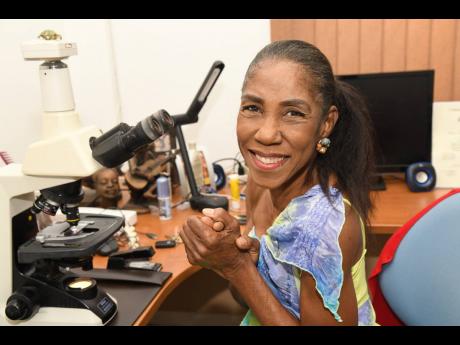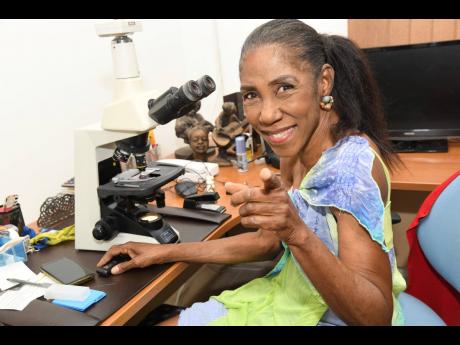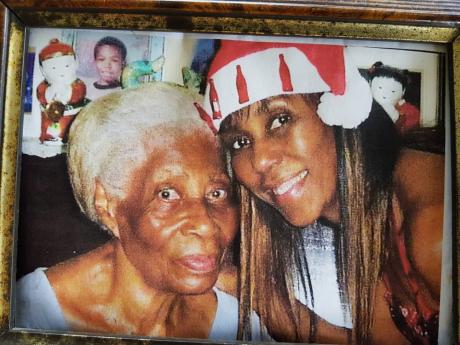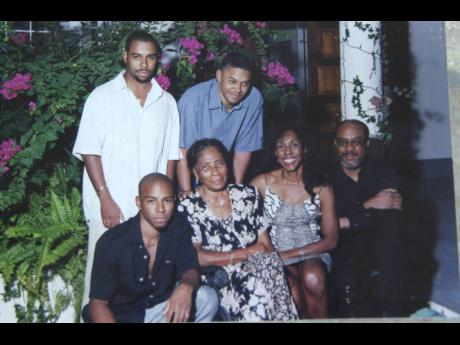Twice victorious in taking fight to breast cancer
Dr Jennifer Mamby-Alexander suspected she had breast cancer three years before she was officially diagnosed.
During self-examination one day, she discovered a tiny grain in her breast and was sent to do a mammogram in the same United States-based hospital at which she worked. The screening turned up nothing and she was told to return in a year to repeat the procedure, but she went back in six months.
By this time, the grain had become larger, but still, she was told there was nothing to worry about.
But the doctor in her knew something was not right and she decided to return to her homeland, Jamaica, to consult with local colleagues.
A trusted friend told her the lump was suspect even without a mammogram.
She was told to do another examination on her return to the United States and after examining the films, she said: “I went to medical school in Jamaica and I know this is cancer.”
Later events would prove her correct as the location of the cancerous cells missed the machine, but not her hand.
“It was right up against the chest wall, so even when the machine grabbed my breast, it wasn’t grabbing everything. Another examination was done by squeezing the breasts, scraping up everything. I asked the radiologist to look at it and give me a report,” Mamby-Alexander shared with The Sunday Gleaner.
“I sent the images to my colleagues in Jamaica, but I knew before the results reached them that it was cancer. I told them I had it for three years but I had been misdiagnosed; do something about it now.”
The next day, she got a call. There was no doubt.
Despite being mentally prepared for such news, Mamby-Alexander froze on hearing the confirmation.
“What the hell am I going to do?” were her first words.
Her husband had the same question when she called him with the news.
“I told him I don’t know, but right now, I am going to lock up the office and go home,” she recalled, adding that she was then the head of cytology – the study of cells – at Montefiore Hospital in New York.
And so her cancer fight began.
FINDING STRENGTH
Mamby-Alexander was more concerned about her mother’s reaction than her immediate situation.
The diagnosis came three days before her mother’s birthday.
“I called her and wished her a happy birthday, but I didn’t tell her,” the doctor recalled.
Instead, she called a colleague in Jamaica and told him when she would tell her mother and asked him to be there for her.
Within a week, she was booked for surgery and she remembered being very weak when she awoke after the procedure.
Intense chemotherapy followed with weekly treatment.
With her blood count low, vomiting and weakness were constant companions, but Mamby-Alexander told herself that she wanted to be alive for her three boys – one then a teenager, another 11 and the youngest being six years old.
An afternoon encounter with one of her sons’ teachers resulted in a major attitude overhaul.
“When she saw me, she said she wanted to ask me something. She said, ‘Every day Gregory comes to school and he tells me his mom is sick. What’s wrong with you?’” Mamby-Alexander recalled.
“I told her I have breast cancer and all I have been going through. And in the middle of the street in New York, she said, ‘Stop. Look at me’, and I asked, ‘What happened?’, and she said, ‘I went through that and you are going to be alright’.
“I said, ‘What?’ When I looked at her, she looked like a million dollars. I said, [if] she go through breast cancer and look like that, I am okay,” she recounted for The Sunday Gleaner.
When she went home, she was greeted by the sound of reggae icon Bob Marley’s anthem Three Little Birds, hearing, “Don’t worry about a thing/Every little thing is gonna be alright.”
Whitney Houston’s One Moment in Time became her personal anthem as began treatment in March 1989 and by November, she was home in Jamaica with the rest of her treatment in hand.
Shortly after landing in Jamaica, she took a chance three-week trip to Australia with her husband after which she returned to the island and he to the United States, where he worked. He would eventually return to Jamaica, but they got divorced.
By December 1989, she was cancer-free.
CALM BEFORE SECOND STORM
Mamby-Alexander said she was turned down for a paid fellowship because she was not American, but determined to learn, she undertook the studies without pay.
Armed with advanced studies and work in cytopathology – “which no one else has to date” – she recalled how Dr Lenny Jackson flew to the United States to be with her while she underwent surgery. He would later help her navigate her way in setting up an office, but she did not like the mundane work of treating aches and pains, colds and coughs.
She found an unused lab at St Joseph’s Hospital and rented the space, bought equipment and began operation.
Other colleagues, including childhood friend Dr Trevor McCartney, sent Mamby-Alexander her first patients – the very first of whom was diagnosed with breast cancer.
She was in her element in cytopathology.
Mamby-Alexander continued her twice-yearly tests as she tallied the years she was cancer-free.
In the 16th year, while sitting in her dining room, she felt two jolts 12 weeks apart. The second time, she thought she was hallucinating when a voice said, “You are not listening to me”, but she was the only one at home.
It prompted her to check again, but nothing was detected.
She persisted with the check, this time without anaesthetics, so she could direct the doctor in removing tissue for the biopsy.
“I am lying there, and I said, ‘Hold on, hold on’. I said, ‘I am going to hold my breath. Take out a good piece’,” she recalled.
“You have to be brave. You cannot have the disease of fear and live. I knew what I had to do and I did it. Then I waited for my results. When the results came, the cancer came back and the same question came back: So what am I going to do now?” she remembered.
Mamby-Alexander said she did not envisage that level of chemo again, so she flew to the United States and was advised to have surgery and then undergo radiation.
Half of her sternum was removed and the attached ribs. It was replaced by a metal plate. The downside is that she now has scoliosis as the removal of the ribs caused a twist of the spine.
VICTORY SCARS, ONGOING FIGHT
At times, Dr Jennifer Mamby-Alexander’s reality seemed ready to overwhelm her.
“There are some days when I get up and I just want to bawl, but I have so much to do I can’t stop to bawl. ... When I remember that I should have cried, I just laugh. But I wanted to be here for my children. I didn’t want anybody else to bring them up. My mother is 105 and half years old and lying in the bed, so why am I crying?” she asked.
Two decades later, she is still experiencing some discomfort and has to make adjustments to her clothes because of the curvature in her back.
Although sometimes she gets depressed, she remains grateful to God.
“I have come out of the battlefield with evidence of the fight, but I am still standing,” she said, labelling the marks on her chest, having gone through a double mastectomy with reconstructive surgery, as victory scars.
But Mamby-Alexander still has another fight in her.
Her home community of Hope Pastures was built with underground electricity connections. The aesthetics were a major pull for the owners and they planted a variety of trees.
But the Jamaica Public Service (JPS) said the underground system was dead and too expensive to restore. It discontinued the use of the underground system and forced the residents to pay for a new overhead one.
“Over my dead body,” she said of giving up that battle, recalling how the family suffered major medical distress when her then 103-year-old mother fell twice while making her way in the dark and had to be hospitalised with broken bones.
The residents lost the battle with JPS in court, but it’s not over for Mamby-Alexander.
The greatest irony, she said, is that the underground system allowed the community to be adorned with trees of various kinds over many decades. Now, the JPS is cutting some of those trees as its wires are now making contact.
“Manor Park Estate had underground power, and after Hurricane Gilbert, they put them overhead and didn’t ask them (residents) to pay for it. They made people in Hope Pastures pay for it. That’s why we are in court. I must win that fight. Must!” she insisted.
Jennifer Mamby-Alexander comes from a family of fighters.
At age 101, her mother, Isola Mamby, walked to Mountain Spring with the assistance of a walker. She contracted COVID-19 at 103 years and survived. Jennifer, too, would contract COVID.
Super proud of her three grown sons - Mark, Gregory and Russell - and granddaughter, Mamby-Alexander hopes to be around for many more years.




